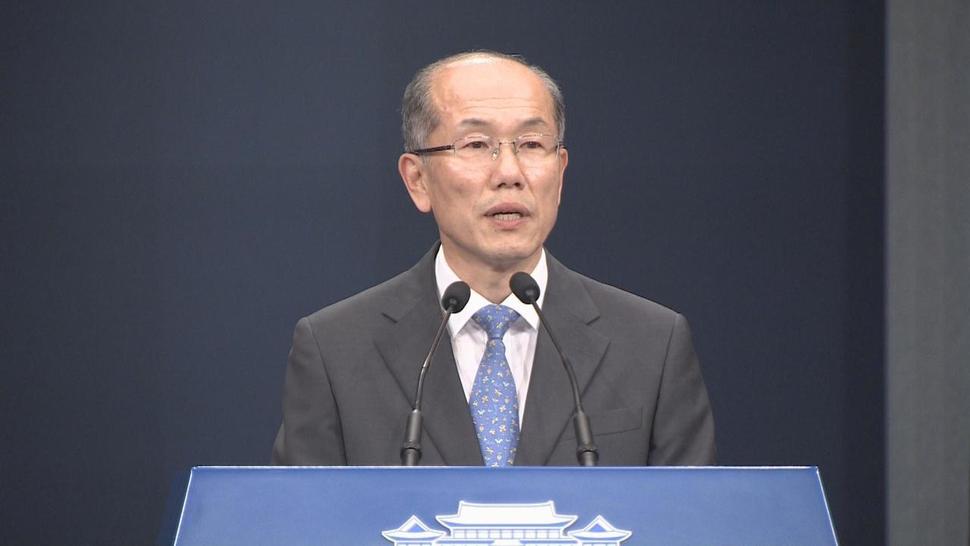 |
|
Kim Yu-geun, first deputy director of the Blue House National Security Office and secretary-general of the National Security Council, provides a briefing on Japan’s export controls at the Blue House on July 12. (Yonhap News)
|
National Security Council suggests investigation from international organization
On July 12, the Blue House’s National Security Council (NSC) expressed its regret for Japanese allegations that South Korea had let strategic materials slip into North Korea, calling those allegations “irresponsible remarks,” and publicly suggested that the two countries have their allegations reviewed by an international organization. In effect, the Blue House has directly accused Japan of imposing export restrictions on South Korea for economic and political purposes and then attempting to justify those restrictions by bringing up irrelevant security concerns, such as an alleged violation of sanctions on North Korea. Such action by the Blue House appears to be based on its belief that it must not ignore Japan’s inconsistent explanations about its rationale for the export controls, which could undermine South Korea’s international credibility, and that it should also address Japan’s intentions to drive a wedge between South Korea and the US. Assessing who has actually failed to implement sanctions against North Korea “As a member of the United Nations, we have strictly abided by the UN Security Council’s sanctions on North Korea and have implemented those in a manner that is both exemplary and highly transparent. It is highly regrettable that senior officials in the Japanese government have continued to make irresponsible remarks insinuating that the South Korean government has violated export regulations and failed to implement sanctions, while failing to provide specific evidence for such claims,” said Kim Yu-geun, who serves both as first deputy director of South Korea’s National Security Office and secretary-general of the National Security Council, during a press conference held on Friday afternoon. “What we propose is a halt to this debate, which isn’t necessary for either side. In order to clearly determine whether the Japanese government’s claims are factual, we propose requesting either an expert panel at the UN Security Council or some other suitable international body to investigate the alleged cases of violations of the four multilateral export control regimes by both South Korea and Japan,” Kim went on to say. In his remarks, Kim placed pressure on the Japanese government. “If this investigation finds wrongdoing by our government, we will apologize and immediately take measures to redress that. But if the conclusion is that we have done nothing wrong, the Japanese government will have to not only apologize but also immediately retract its retaliatory export controls. There will also have to be a thorough investigation of alleged violations by Japan,” he said. These remarks followed those made by South Korean Prime Minister Lee Nak-yeon during an appearance before the Special Committee for Budget and Accounts on Friday morning. “Rather than mistrusting each other, our two countries have an urgent need to restore trust through a joint assessment of any suspicions they may have,” Lee said. Tokyo aims to drive wedge in SK-US relations Kim’s press conference that day appeared to have been rooted in the conclusion that Seoul can no longer remain silent in the face of Tokyo’s attempts to rationalize its export controls with ever-shifting reasons. It amounts to an open rebuttal at the government level – sending the message that Japan should not attempt to muddy the waters with farfetched arguments. As the basis for its export control measures, the Japanese government initially cited retaliation for South Korean Supreme Court rulings ordering compensation for damages suffered by forced labor conscription victims during Japan’s colonial occupation of South Korea. But after domestic and overseas critics denounced it for resorting to economic retribution over a political issue, it began alleging the “diversion of strategic goods” and “non-enforcement of North Korea sanctions.” “Japan keeps moving the goalposts and offering farfetched excuses. They want to make the point clear so that we can have it out as to who’s right and wrong,” a Blue House official explained. During his press conference, Kim stressed that South Korea, the US, and Japan had “closely coordinated in the past to crack down tightly on illegal ship-to-ship transfer activity on the seas,” while South Korea had “amply shared intelligence with Japan on export controls and efforts to enforce sanctions.” “The Japanese government needs to produce clear evidence of this ‘non-compliance with [international] norms’ and ‘inappropriate actions’ by the South Korean government,” a bristling Kim added. In addition to confidence in its enforcement of North Korea sanctions resolutions, another aim in the Blue House’s decision to come out directly with a strong message was to thwart Tokyo’s attempt to use the sanctions issue to drive a wedge between Seoul and Washington. In his message, Kim stressed that the South Korean government had publicly announced the discovery of around 150 cases of export control regime violations over the past four years, adding that South Korea – uniquely among the three countries of South Korea, the US, and Japan – had detained six vessels suspected of engaging in illegal ship-to-ship transfer activities. “Japan should ask itself whether it’s operating a transparent export control system with these measures,” he said. At a National Security Council meeting the day before, the Blue House reportedly conducted a close examination of the enforcement of North Korea sanctions and concluded that there were no issues with it. By Seong Yeon-cheol, staff reporter Please direct comments or questions to [english@hani.co.kr]






